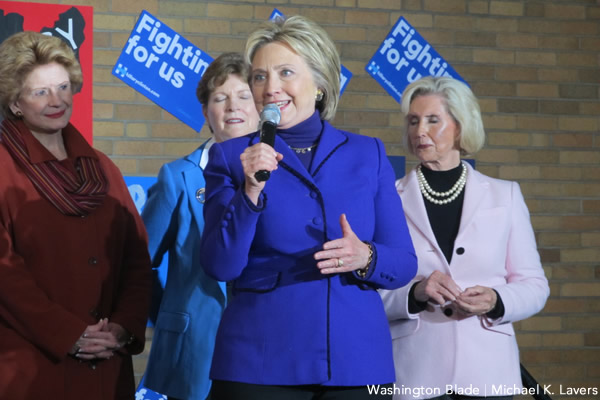a&e features
Hillary’s historic moment
Long-time feminists say gender is a factor in this year’s race
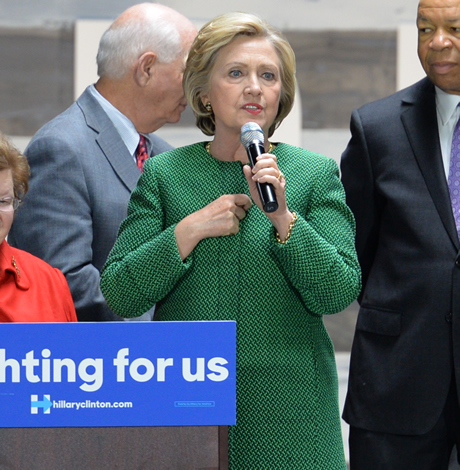
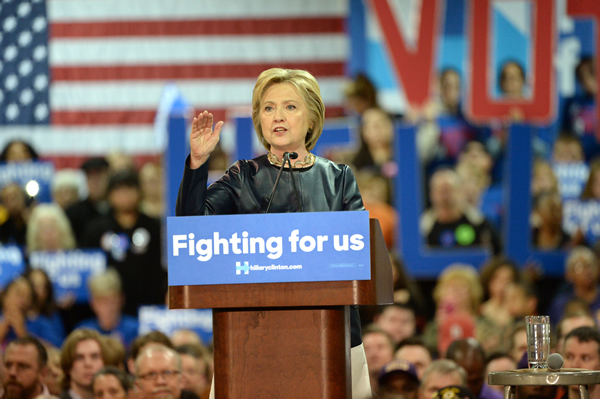
Hillary Clinton enjoys strong support among lesbian feminists. (Photo by Gino Santa Maria; courtesy Bigstock)
Benghazi! Hillary’s e-mails! Trump! At danger of getting lost in the overheated discourse of this year’s U.S. presidential election is the historic fact that Hillary Clinton is now the first woman to capture a major-party nomination for president.
There was Shirley Chisholm (who ran for the Democratic nomination in 1972), Geraldine Ferraro (Walter Mondale’s running mate in 1984), even Sarah Palin (John McCain’s running mate in 2008), but no woman has ever come as close to the presidency as Hillary Clinton.
In the wake of this achievement, what does it mean for the lesbian community, a group that has always been one of her strongest supporters? And why has the historic nature of her candidacy felt like little more than a footnote this year?
Hillary fatigue?
Out political comedian Kate Clinton thinks it’s because Hillary has been around so long — since 1978. Still, she says, it’s exciting to see Hillary win the nomination.
“I think it’s absolutely very, very exciting,” Kate Clinton says. “And add to the fact that she is the first woman nominee for a major party, is astounding.”
As the first out lesbian and African-American mayor in the United States, Denise Simmons of Cambridge, Mass., is used to her gender, race and sexual orientation making headlines.
Simmons expected Hillary’s nomination to get much more attention than it’s received. She agrees with Kate Clinton’s assessment.
“I do wonder if perhaps part of this is simply because she has been a national figure for such a long time,” Simmons says. “And therefore the sense of novelty just isn’t there.”
Elizabeth Birch, who served as executive director of the Human Rights Campaign from 1995-2004 and is also a friend of Clinton’s, says Clinton does not want the fact that she’s a woman to be the sole reason for anyone to vote for her.
“I think that’s why she’s been painstaking about amassing her credentials over the last two decades,” Birch says. “She absolutely wants [her election] to be on her merit, but nevertheless, none of us should forget what an extraordinary breakthrough this will be.”
Clinton’s gender, Birch says, is treated like a distraction from the “political theater” going on.
Blues singer and LGBT and black rights activist Gaye Adegbalola agrees with Birch. She thinks Clinton’s nomination isn’t headline news because Trump has “hijacked” the headlines.
“He’s the story,” Adegbalola says.
Kate Clinton says that any time some excitement is generated for Clinton, Trump will say something controversial, Benghazi and the email scandal are brought up and Americans become fixated on her purported failures.
“The Koch brothers, who, I like to call the cock brotherhood, have targeted money to just make her unfavorable, untrustworthy,” Kate Clinton says.
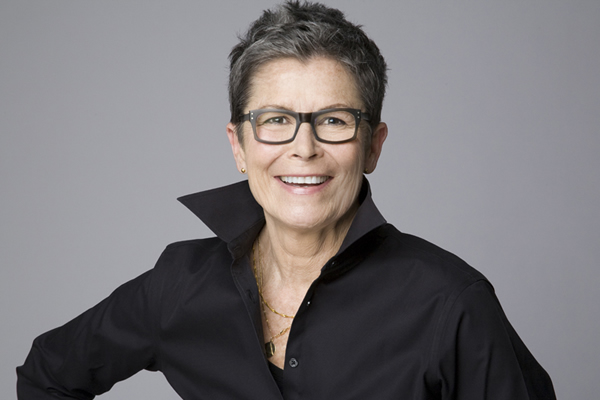
Kate Clinton says accusations that Hillary Clinton is untrustworthy are ‘absurd.’ (Blade file photo)
Trust issues
Kate Clinton says the fact that Hillary Clinton is painted as untrustworthy in the news media is absurd.
But, in many recent polls, conducted by the Huffington Post, pollingreport.com and CNN, many Americans say they do not trust Hillary Clinton.
Is the lack of trust in Hillary because of her politics, or could it be attributed to sexism?
Birch doesn’t think so.
“My diagnosis is that Hillary Clinton is extremely private for someone in the public sphere,” she says. “And she has, throughout her life, had unrealistic expectations for privacy.”
Birch says that in trying to protect her privacy and keep her life and decisions under wraps, Clinton has been misread.
“The level of transparency that’s required when you are in a position like the various positions she’s been in … all those steps she took to preserve privacy only lead to more problems,” she says. “You know, it’s never the actual crime, it’s always the cover-up.”
This, according to Birch, has always been Clinton’s downfall.
“The Clintons, as political figures, have certainly been guarded at many points throughout the past three decades, often with good reason,” Birch says. “And unfortunately this has opened Hillary Clinton to charges of having something to hide.”
Simmons disagrees with Birch. She says the lack of trust among voters has a lot to do with gender.
“Any time a female candidate is painted as untrustworthy, or shrill or calculating, one does wonder whether there is some sexism at play,” Simmons says.
Rev. Elder Darlene Garner, minister and LGBT activist and co-founder of the National Coalition of Black Lesbians and Gays, makes a different assessment. She blames populism for Clinton’s perceived untrustworthiness.
“I think it is blatant populism that masks sexism, that masks homophobia and transphobia, that masks racism and nationalism,” Garner says.
Adegbalola says that anyone who’s been in Washington as long as the Clintons will undoubtedly amass some “dirt,” but she says this is just how politics works.
“There has to be some bargaining and there has to be some, ‘I’ll kiss your ass, you kiss mine,’ kind of stuff that goes on,” she says.
When Hillary Clinton ran against Barack Obama in 2008, Adegbalola donated $25 to her campaign.
“I was all, you know, ‘Yay, a woman can do this,’ and then Barack started running and I was so in favor of him,” Adegbalola says. “Not necessarily because he was a black man, but because he hadn’t been in D.C. [for long].”
She also liked that he had worked for social justice in Chicago and that he had not been in the U.S. Senate for long.
“My excitement with him was that he was an outsider,” she says. “So now, here you got Trump, who comes along and he’s really an outsider and an asshole, but I think a lot of people take to him for that very reason, that he’s an outsider.”
Adegbalola thinks it’s hypocritical, however, for people to distrust Clinton but not Trump.
“Anybody who makes all that money,” Adegbalola says, “they’ve got to be doing some shady stuff, too.”
She’s astonished by how successful Trump has been.
Garner is surprised too and thinks that Trump’s success reveals the continued work for justice and equality that needs to be done.
“As a movement we have focused on legislative gains and have not given much attention to the quality of our relationships with one another,” Garner says.
Kate Clinton, on the other hand, does not think it’s surprising that Trump has been so successful. She is tired of people, especially Republicans, acting as if he is not representative of certain American beliefs.
She views Trump as a joke who desperately wants to be taken seriously.
“That’s where the danger is,” she says.
Kate Clinton believes that Trump’s desire to be taken seriously boiled over at the White House Correspondents Dinner in 2011. Obama referred to Trump’s threat to run for president at that dinner as a “joke.” Kate Clinton theorizes that Obama’s barrage of jokes at Trump’s expense is what propelled him to run.
“I really think that was the moment he decided, ‘I am not going to have a black man making fun of me,’” Clinton says.
Birch describes Trump as “dangerous.”
“I think the way that human society stays in equilibrium is to have extremely predictable institutions and leaders,” Birch says. “[If leaders] innovate somewhat in the structure of the institutions, I think humans don’t want jarring abrupt moves and they don’t want emotions stirred, played on and exploited.”
Trouble ahead?
Birch says unpredictable leaders bring problems.
“I think that waves move through every community and I think that his rhetoric has given license to some of this more acute tension in our country right now,” she says.
Simmons agrees.
“I find it incredibly disappointing that one of our major parties would see fit to nominate him to potentially lead the country,” she says. “He could do tremendous damage to our nation on a number of fronts.”
Adegbalola says a Trump presidency could be cataclysmic.
“I think it’s going to be even more divisive for America,” she says. “I think it’s going to widen the gaps between people of color and whites and marginalized people and the white establishment. I’m sure he has a lot of confederate flags in that audience, I’m sure.”
Kate Clinton cites Trump’s nomination of Mike Pence for vice president as representative of his disregard for the rights of marginalized people.
“Pence is hideous toward women,” she says.
Pence came to national attention in 2006 when he said that LGBT couples represented a “societal collapse” in the United States. He has often referred to being gay as a choice and same-sex partnerships as a violation of “God’s idea.”
He made national news again in 2011 when, as a member of Congress, he pushed for a bill to defund Planned Parenthood. In May, Pence rejected the Obama administration’s directive for school districts to allow students to use the bathroom for the gender they identify with saying the Obama administration had no business getting involved in “issues of this nature.”
Adegbalola also points out what could happen to the Supreme Court if Trump is elected.
Despite all this, there are still many people who look at Hillary Clinton’s past and are disturbed by her voting patterns.
In 1996, she supported the Defense of Marriage Act that defined marriage for federal purposes as the union between one man and one woman, and allowed states to refuse to recognize same-sex marriages performed under the laws of other states. Her support for the bill haunted her for two decades.
Kate Clinton says that the LGBT community needs to remember that she was not president when the act was passed.
“That was her husband,” Clinton says. “I think she was pretty representative of very political people weighing everything, trying to figure out and trying to say the right thing at the right time and that killed her career.”
In a campaign that many say is structured around humiliation and elitism, Garner says that voting for Hillary Clinton is important.
“I believe that she is a champion for human dignity and justice and I would expect that as president she would continue to do the same,” she says.
She cites Clinton’s attitudes toward children as proof that her presidency would benefit LGBT families.
“Her support of health care and even continued health care reform, will benefit all of us, including women,” Garner says. “And her economic policies will also benefit women, who are still underpaid in the American work force, and her presidency will be a direct benefit to lesbians as well as to all women.”
Adegbalola cites her own experiences as a self-employed musician and cancer survivor as one of the main reasons she plans to vote for Clinton. She says that in 2008 she was paying more than $700 a month for cancer treatment.
The Affordable Care Act, she says, is of paramount importance to her and she knows that under Clinton, Obama’s work will continue.
Birch says that growing up in Canada and seeing Queen Elizabeth’s picture hanging on the wall in all of her elementary school classrooms and having a female principal, made her think that women were in charge.
“I just thought, ‘Oh yeah my name is Elizabeth, the queen is Elizabeth, I guess I can go far,’” she says. “The psychological impact it will have on inspiring and lighting fires in young women … we can never underestimate it.”
Adegbalola, however, says at this point she is over Clinton’s gender.
“I’m simply looking at who would I vote for between the two,” she says. “[It’s] Hillary, there’s no question. And she’s smart and she’s been there, she’s paid her dues.”
Adegbalola doesn’t feel that anyone in the Republican Party, including Trump, would do anything to look out for marginalized people.
“I’m black, I’m poor, I’m a woman, I’m a lesbian, I’m a single parent, I’m old,” she says. “[That’s] like six kinds of oppression, so they might lock me up in a concentration camp.”
a&e features
Queer TV anchors in Md. use their platform ‘to fight for what’s right’
Salisbury’s Hannah Cechini, Rob Petree are out and proud in Delmarva
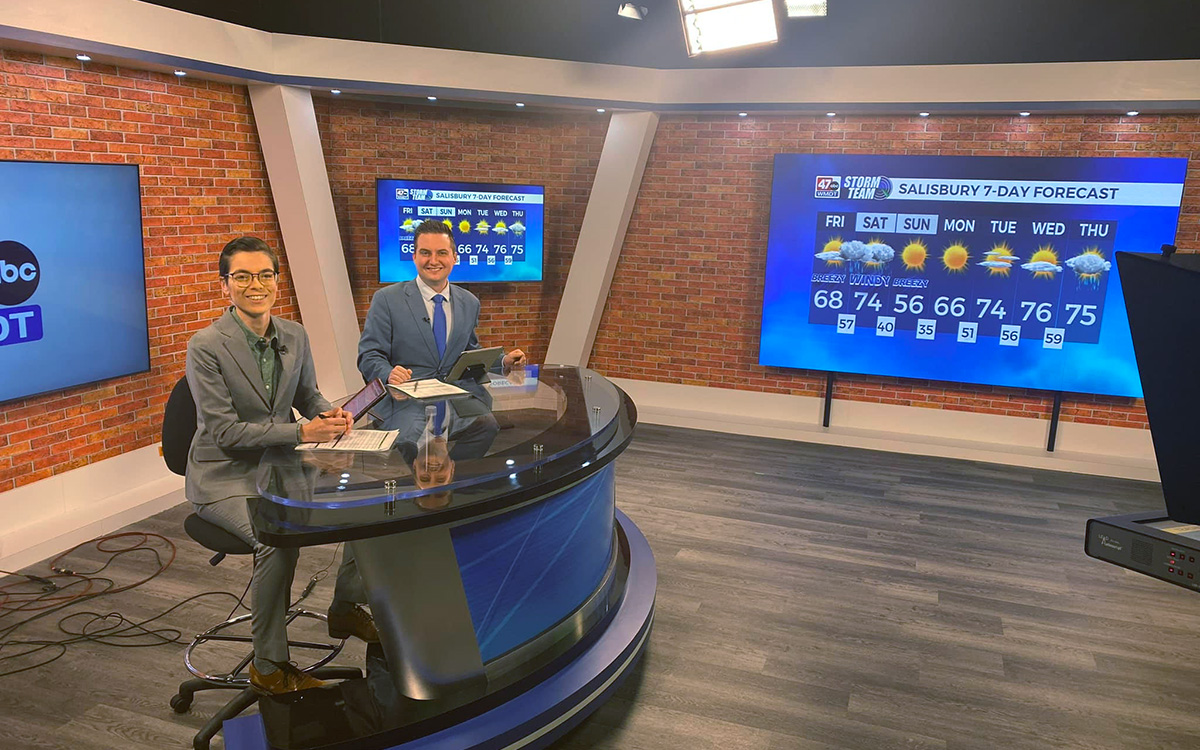
Identity can be a tricky thing for journalists to navigate. The goal of the job is to inform the public with no bias, but this is difficult, if not impossible, to do in practice. Everything from your upbringing to the books you read can impact how you view and cover the world. But sometimes these factors can help shine a light on an underrepresented community or issue.
Two broadcast journalists in Salisbury, Md., are using the subtle, yet impactful choice of sharing their queer identities to strengthen their reporting and connection to the community.
Hannah Cechini, who is non-binary, and Rob Petree, who is gay, co-host the 5:30-6:30 p.m. newscast for WMDT 47. They are the only known anchor team that are not only both queer, but also open out about their identities on air and, as Petree put it, “always use [their] platform and power that [we] have to fight for what’s right.”
Cechini’s passion for journalism played an important role in the discovery of their gender identity. They knew they were meant to be in the newsroom before they figured out they were non-binary.
“I was doing this job before I started to identify as non-binary,” Cechini told the Blade. “I’d always watch the evening news with my dad growing up and thought it was the coolest thing. And throughout high school, I worked on the school paper.”
After graduating from Suffolk University in Boston, Cechini’s passion for journalism only grew as they began to work in the world of news media, eventually ending up in Salisbury. As they honed their writing, editing, and anchoring skills at WMDT, Cechini also started to take an introspective look into their gender identity.
A little more than two years ago Cechini came out as non-binary to their coworkers in the newsroom and was met with support all around. “It was definitely smoother than I anticipated,” they said.
“It is very freeing to be able to do this job as a non-binary person because I haven’t really seen much of that representation myself.”
Petree, on the other hand, knew he was gay right around the same time he became interested in news media, at age 14. He started working for his high school news show and used it as a way to be open about his sexuality rather than hide it.
“I broke into broadcasting doing the morning announcements,” he said. “I did the weather and started doing a segment called issues and insights,” Petree said, explaining his introduction to the news. Eventually, students would ask him questions about his sexuality after seeing him on the school TV. “It had gotten to the point in school, that if you’re going to come up and ask me if I’m gay, well shit, I’m going to tell you!”
To him, this was the exact reason he had come out. Petree wanted to motivate others to live honestly.
“There are a lot of people who will spend most of their lives not being out so if they can see someone like me, who’s out and proud doing his thing, so to speak, then maybe that’s the inspiration for them,” Petree said. “To search their own soul, find out who they are, and live their full life.”
Petree explained that he got his start in a space that was not always welcoming to his queerness. This tested the delicate balance between being a journalist and holding your identity close.
“I’ve always been out and it was a challenge because I got my start in conservative talk radio,” Petree said. “I’m going to be honest, some of the things I heard from people I’ve worked with, from the callers to the radio stations were absolutely abhorrent. But I never let it discourage me. It made me work that much harder.”
Cechini highlighted the same sentiment when explaining why it’s important to have out LGBTQ figures in news media. They want to show everyone that it is possible to be openly queer and successful.
“I just think that representation matters because if ‘Joe,’ who’s never seen a transgender person before, sees a transgender person or a non-binary person, doing a job that they’ve only ever seen straight cis people doing before, it kind of creates that understanding or bridges that gap,” Cechini said. “It’s like, ‘OK, maybe they’re not that different from me.’ And that facilitates being able to connect among different communities.”
Both Cechini and Petree agree that having a queer coworker has made their bond stronger.
“It’s great to have someone else next to me who I can relate to and work alongside,” Petree said. “And they’re a joy to work with, they really are. There is a tremendous amount of things that we relate to together — like we both share and have the same affinity for Lady Gaga,” he said laughing. “Although they’re more of a Lady Gaga fan than I am.”
“Hannah is a tremendous journalist who really goes out of their way to make sure that the stories that they do are on point 100% of the time,” he added. “They’ve been great to work with and to learn from and to grow alongside. I’m very happy to have them as my co-anchor.”
Cechini explained that the relationship between two co-anchors can make or break a newscast, and having Petree as their partner on air is a major part of the show’s success.
“Co-anchoring is not just the relationship that you have on camera,” Cechini said. “It’s really, really important to have a good relationship with your co-anchor off-camera as well because you have to have a level of trust between you.”
Cechini continued, saying that this relationship is crucial to working together, especially when things don’t go as planned.
“Not everything always goes to script,” they said. “Sometimes you have to be able to work together without even really talking to each other and just kind of know what to do. When you have a relationship like that with someone who identifies similarly to you or has had similar life experience, I think that just only strengthens that [relationship].”
Although they have had similar experiences being from the LGBTQ community, Petree said it was a change for him to use “they/them” pronouns on air.
“Prior to working with Hannah, I’ve never worked with a non-binary individual who went by the pronouns ‘they/them,’” Petree said. “It was new for me to not use traditional pronouns on air, but I can say that I have never misgendered them on air and never will. You get conditioned to using traditional pronouns and it’s easy to make that mistake, but I never have.”
At the end of the day, they both explained, it is about doing the job right. For the duo, a part of that is understanding the diversity of people and issues in the community.
“When you come from a more marginalized community, I think that kind of helps to inform you a little better as a journalist because you have a better understanding of what it’s like to be ‘the other guy,’” Cechini said.
“Our talent and our drive for journalism speaks for itself,” Petree said. “And that resonates with people. Have we shown ourselves to be an inspiration to the LGBTQ+ community here in Delmarva? Yes, we have. And that’s something that I’m proud of.”
The primetime nightly newscast with Hannah Cechini and Rob Petree airs weeknights from 5:30-6:30 p.m. on ABC affiliate WMDT 47.
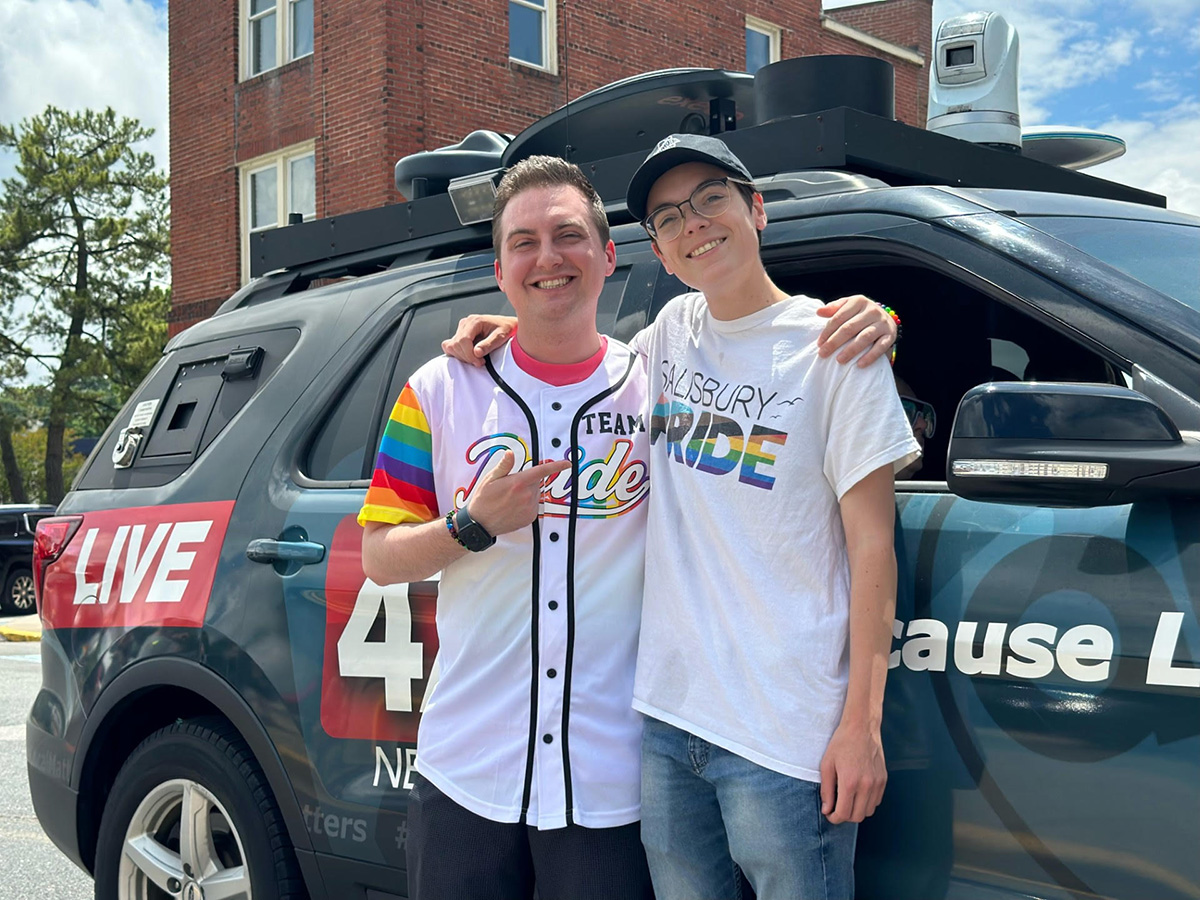
a&e features
‘Queering Rehoboth Beach’ features love, loss, murder, and more
An interview with gay writer and historian James T. Sears
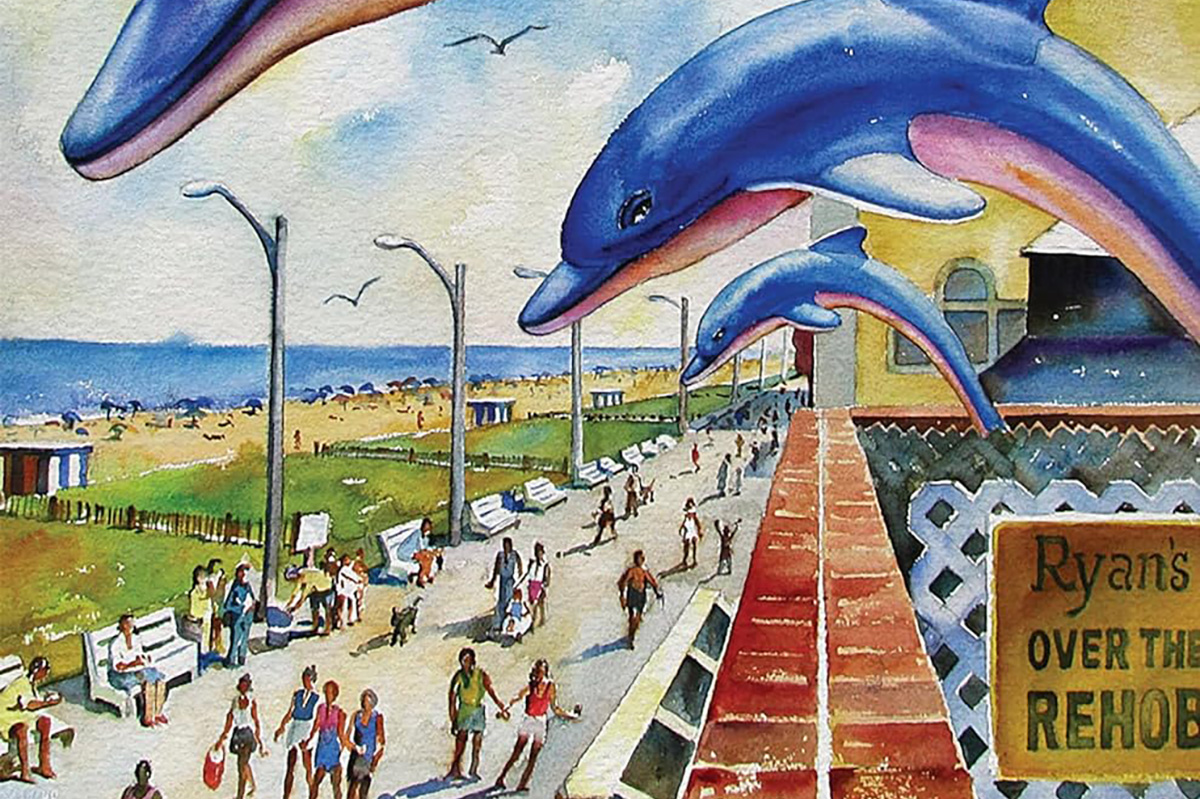
James T. Sears book talk
Saturday, June 29, 5 p.m.
Politics & Prose
5015 Connecticut Ave., N.W.
When it comes to LGBTQ summer destinations in the Eastern time zone, almost everyone knows about Provincetown, Mass., Fire Island, N.Y., and Key West, Fla. There are also slightly lesser known, but no less wonderful places, such as Ogunquit, Maine, Saugatuck, Mich., and New Hope, Pa. Sandwiched in between is Rehoboth Beach, Del., a location that is popular with queer folks from D.C., Maryland, Virginia, Pennsylvania, and New Jersey. The dramatic and inspiring story of how Rehoboth Beach came to be what it is today can be found in gay historian James T. Sears’s revealing new book “Queering Rehoboth Beach: Beyond the Boardwalk” (Temple University Press, 2024). As educational as it is dishy, “Queering Rehoboth Beach” provides readers with everything they need to know (and possibly didn’t realize they needed to know) about this fabulous locality. Sears was kind enough to make time to answer a few questions about the book.

WASHINGTON BLADE: James, it’s been a few years since I’ve interviewed you. The last time was in 1997 about your book “From Lonely Hunters to Lonely Hearts: An Oral History of Lesbian and Gay Southern Life.” At the time, you were living in Columbia, S.C. Where are you currently based, and how long have you been there?
JAMES T. SEARS: It has been great reconnecting with you. After that book, we moved to Charleston, S.C. There I wrote several more books. One was about the Mattachine group, focusing on one largely misunderstood leader, Hal Call. Another book shared reminisces of a 90-year-old gentleman, the late John Zeigler, interweaving his diaries, letters, and poetry to chronicle growing up gay in the South at the turn of the last century. From there I moved to Central America where I chronicled everyday queer life and learned Spanish. We returned several years ago and then washed up on Rehoboth Beach.
BLADE: In the introduction to your new book “Queering Rehoboth Beach: Beyond the Boardwalk” (Temple University Press, 2024), you write about how a “restaurant incident” in Rehoboth, which you describe in detail in the prologue, became a kind of inspiration for the book project. Please say something about how as a historian, the personal can also be political and motivational.
SEARS: I want to capture reader’s interest by personalizing this book more than I have others. The restaurant anecdote is the book’s backstory. It explains, in part, my motivation for writing it, and more crucially, introduces one meaning of “queering Rehoboth.” That is, in order to judge this “incident”—and the book itself—we need to engage in multiple readings of history, or at least be comfortable with this approach. I underscore that what is accepted as “history”—about an individual, a community, or a society—is simply a reflection of that era’s accepted view. Queering history challenges that consensus.
BLADE: Who do you see as the target audience for “Queering Rehoboth Beach?”
SEARS: Well, certainly if you have been to Rehoboth or reside there, this book provides a history of the town—and its queering—giving details that I doubt even locals know! Also, for those interested in the evolution of other East Coast queer resorts (Ptown, Fire Island, Key West) this book adds to that set of histories. My book will also be of interest to students of social change and community organizing. Most importantly, though, it is just a good summer read.
BLADE: “Queering Rehoboth Beach” features numerous interviews. What was involved in the selection process of interview subjects?
SEARS: I interviewed dozens of people. They are listed in the book as the “Cast of Narrators.” Before these interviews, I engaged in a systematic review of local and state newspapers, going back to Rehoboth’s founding as a Methodist Church Camp in 1873. I also read anecdotal stories penned by lesbians and gay men. These appeared in local or regional queer publications, such as Letters from CAMP Rehoboth and the Washington Blade. Within a year, I had compiled a list of key individuals to interview. However, I also interviewed lesbians, gay men, transgender individuals, and heterosexuals who lived or worked in Rehoboth sometime during the book’s main timeframe (1970s-2000s). I sought diversity in background and perspective. To facilitate their memories, I provided a set of questions before we met. I often had photos, letters, or other memorabilia to prime their memories during our conversation.
BLADE: Under the heading of the more things change, the more they stay the same, the act of making homosexuality an issue in politics continues to this day. What do you think it will take for that to change?
SEARS: You pose a key question. Those who effectuated change in Rehoboth — queers and progressive straights — sought common ground. Their goal was to integrate into the town. As such, rather than primarily focus on sexual and gender differences, they stressed values held in common. Rather than proselytize or agitate, they opened up businesses, restored houses, joined houses of worship, and engaged in the town’s civic life.
To foster and sustain change, however, those in power and those who supported them also had to have a willingness to listen, to bracket their presuppositions, and to engage in genuine dialogue. Violent incidents, especially one on the boardwalk, and the multi-year imbroglio of The Strand nightclub, gradually caused people to seek common ground.
That did not, however, come without its costs. For some — long separated from straight society — and for others — unchallenged in their heteronormativity — it was too great of a cost to bear. Further, minorities within the queer “community,” such as people of color, those with limited income, and transgender individuals, never entered or were never invited into this enlarging public square.
The troubles chronicled in my book occurred during the era of the “Moral Majority” and “Gay Cancer.” Nevertheless, it didn’t approach the degree of polarization, acrimony, fake news, and demagoguery of today. So, whether this approach would even be viable as a strategy for social change is debatable.
BLADE: In recent years, there has been a proliferation of books about LGBTQ bars, a subject that is prominent in “Queering Rehoboth Beach.” Was this something of which you were aware while writing the book, and how do you see your book’s place on the shelf alongside these other books?
SEARS: Queering heterosexual space has been a survival strategy for generations of queer folks. These spaces — under-used softball fields, desolate beaches, darkened parks, and out-of-the-way bars — are detailed in many LGBTQ+ books, from the classic, “Boots of Leather, Slippers of Gold,” to the recently published “A Place of Our Own” and “The Bars Are Ours.” Of course, these spaces did not encompass the kaleidoscope of queer life, but they provide us a historical gateway into various segments of a queer community and culture.
This was certainly true for my book. Unsurprisingly, until The Strand controversy, which began in 1988, all of Rehoboth’s queer bars were beyond the town limits. There were, however, homosexual watering holes in the liminal sexual space. For instance, you had the Pink Pony on the boardwalk during the 1950s and the Back Porch Café during the 1970s. So, in this sense, I think “Queering Rehoboth Beach” fits well in this ever-enlarging canon of queer history.
BLADE: As one of the most pro-LGBTQ presidents in U.S. history, how much, if it all, did the Biden Delaware connection have to do with your desire to write “Queering Rehoboth Beach?”
SEARS: It is just a coincidence. Interestingly, as I was researching this book, I came across a 1973 news story about Sen. Joe Biden speaking at a civic association meeting. One of the 30 or so residents attending was James Robert Vane. The paper reported the senator being “startled” when Vane questioned him about the ban on homosexuals serving in the U.S. civil service and military. Uttering the familiar trope about being “security risks,” he then added, “I admit I haven’t given it much thought.” In Bidenesque manner, he paused and then exclaimed, “I’ll be darned!”
Biden was a frequent diner at the Back Porch Café, often using the restaurant’s kitchen phone for political calls. Like the progressives I spoke about earlier, he had lived in a heteronormative bubble—a Catholic one at that! Yet, like many in Rehoboth, he eventually changed his view, strongly advocating for queer rights as Vice President during the Obama administration.
BLADE: How do you think Rehoboth residents will respond to your depiction of their town?
SEARS: Well, if recent events are predictive of future ones, then I think it will be generally positive. My first book signing at the locally owned bookstore resulted in it selling out. The manager did tell me that a gentleman stepped to the counter asking, “Why is this queer book here?”— pointing to the front table of “Beach Reads.” That singular objection notwithstanding, his plan is to keep multiple boxes in stock throughout the summer.
BLADE: Over the years, many non-fiction and fiction books have been written about places such as Provincetown, Fire Island, and Key West. Is it your hope that more books will be written about Rehoboth Beach?
SEARS: My hope is that writers and researchers continue to queer our stories. Focusing on persons, events, and communities, particularly micro-histories, provides a richer narrative of queer lives. It also allows us to queer the first generation of macro-histories which too often glossed over everyday activists. So, as the saying goes, let a thousand flowers bloom.
BLADE: Do you think that “Queering Rehoboth Beach” would make for a good documentary film subject?
SEARS: Absolutely, although probably not on the Hallmark Channel [laughs]! It would make an incredible film — a documentary or a drama — even a mini-series. Because it focuses on people: their lives and dreams, their long-running feuds and abbreviated love affairs, their darker secrets, and lighter moments within a larger context of the country’s social transformation. “Queering Rehoboth Beach” details the town’s first gay murder, the transformation of a once homophobic mayor, burned-out bars, and vigilante assaults on queers, the octogenarian lesbian couple, living for decades in Rehoboth never speaking the “L word,” who die within months of one another. It, too, is a story of how the sinewy arms of Jim Crow affected white Rehoboth — gay and straight. In short, “Queering Rehoboth Beach” is about a small beach town, transformed generation over generation like shifting sands yet retaining undercurrents of what are the best and worst in American life and culture.
BLADE: Have you started thinking about or working on your next book?
SEARS: The manuscript for this book was submitted to the publisher more than a year ago. During that time, I’ve been working on my first book of fiction. It is a queer novel set in early nineteenth century Wales against the backdrop of the Napoleonic wars and industrialization. I want to transport the reader into an era before the construction of homosexuality and at the inception of the women’s movement. How does one make meaning of sexual feelings toward the same gender or about being in the wrong gender? In the process of this murder mystery, I integrate Celtic culture and mythology and interrogate how today’s choices and those we made in the past (and in past lives) affect our future and those of others.
The Blade may receive commissions from qualifying purchases made via this post.
a&e features
D.C. Latinx Pride seeks to help heal the community
Much history lost to generations of colonialism
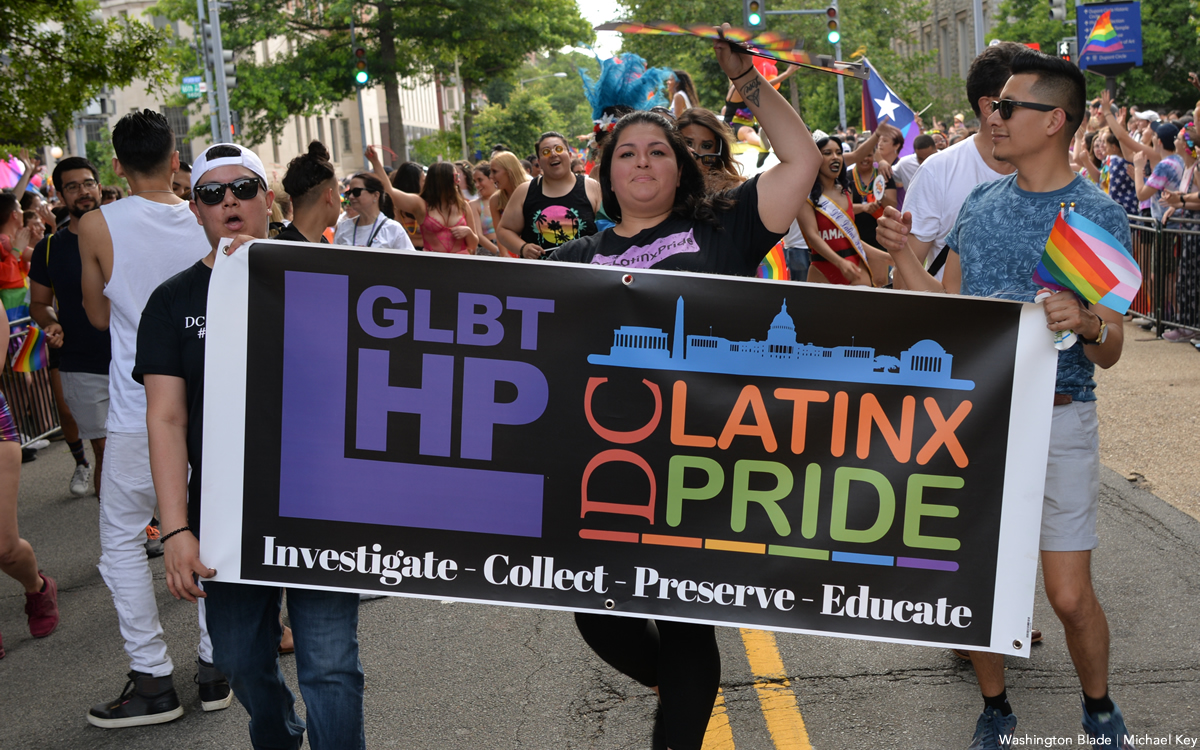
The Latinx History Project will host its 18th annual Latinx Pride with a series of 11 events this year.
Latinx History Project, or LHP, was founded in 2000 to collect, preserve and share Latinx LGBTQ+ History. Six years later, they began hosting DC Latinx Pride.
Board member Dee Tum-Monge said organizers saw a need for the event that centered Latinx community members.
“LHP knows our queer history as Latinx folks has most often been lost to generations of colonialism and imperialism,” they said. “Which is why we focus on documenting and highlighting the impact our community has in D.C. and beyond.”
According to UCLA School of Law, there are more than two million Latinx LGBTQ adults that live in the U.S.
“Events specifically for the Latinx community are important not only to make our experience visible but also to create spaces where we can grow closer with other groups and each other,” said Tum-Monge.
This year they kicked off DC Latinx Pride with a crowning ceremony for their royal court on May 31.
Their three-part series, “La Sanación”, is underway with part two planned for June 16.
“Sanación in Spanish means ‘healing’ which is a big part of what we want to bring to Pride,” said Tum-Monge. “Our communities go through a lot of trauma and hate, but we know there’s more to us. Our goal is to foster connection with ourselves, nature, community, and spirituality.”
In conjunction with the series there is a slate of other events; tickets can be purchased at latinxhistoryproject.org/pride.
In addition, Latinx Pride will march in the Capital Pride Parade on Saturday and participate in the festival on Sunday. To stay involved with Latinx History Project after Pride and hear more about future events visit latinxhistoryproject.org.
-

 Canada1 day ago
Canada1 day agoToronto Pride parade cancelled after pro-Palestinian protesters disrupt it
-

 Theater5 days ago
Theater5 days agoStephen Mark Lukas makes sublime turn in ‘Funny Girl’
-

 Baltimore4 days ago
Baltimore4 days agoDespite record crowds, Baltimore Pride’s LGBTQ critics say organizers dropped the ball
-

 Sports4 days ago
Sports4 days agoHaters troll official Olympics Instagram for celebrating gay athlete and boyfriend

